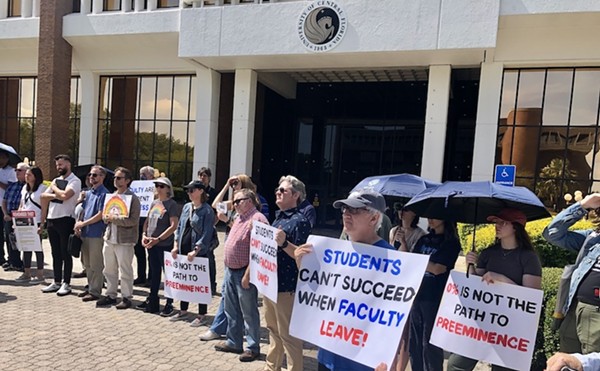Opt out: That's what a group of Orlando parents decided to do rather than have their kids take the new Florida Standards Assessment tests that debuted in schools this year. Parents say the state's new standardized tests (which originated in Utah, where student scores plummeted when they were introduced in that state) are riddled with problems. Some parents say they're faulty; they don't truly assess where a student is at educationally, and they were rolled out without enough time for teachers or students to prepare for them. Since a poor score on the new tests could send students back a year, these parents engaged in an act of civil disobedience this testing season by having their kids show up to school on exam day and open their test booklets, but refuse to sign them or fill in answers for any of the questions.
On Facebook, a group of 3,000 parents have gathered under the banner of Opt Out Orlando. There, they share information about how to properly "opt out," how to discuss their decision with teachers and school administrators, and what to do if they meet with resistance. The parents say this isn't a reflection on their kids' schools or teachers, nor is it a protest against all standardized testing – rather, they say, it's an attempt to exercise some control over their kids' education and let legislators and state education officials know that they want a say in what happens in the classroom.
Opt Out Orlando was started by education activist and parent Cindy Hamilton, who says she thought a "grassroots local operation" was needed in the city's schools. While there are larger "opt out" groups that operate on a national level, she thinks parents need to act locally to send a direct message from their schools to the state Legislature.
Parents in the movement are furious about the lack of representation for educators in Tallahassee, and none of them likes the money that goes to test-making companies for each individual student. When a student fails the FSA, the testing company gets more money, they say, because the state has to buy more copies of the test so the student can keep taking it until he or she eventually passes.
"They all have a lot to gain by the failure of our students," Hamilton says. "The publishing companies – they have to reorder another test, provide it to a student that failed and get them back into passing status. It's more money in their pockets."
While proponents of the new test claim it is good method for measuring what students are learning in the classroom (as they did with the FCAT, which the FSA replaced), the parents of Opt Out feel that the punishments for not doing well on the tests are too high – one bad testing day has the potential to land kids in remedial classes, whether they really need them or not, and could therefore have a lasting impact on a child's entire education.
"I think the great awakening will come when Johnny Smith, who is a straight-A student, fails the FSA," Hamilton says.
At the core of the movement are not activists or reformers, but parents. Members of the group share news stories about opt out movements and their own experiences. They help one another in opting out. They answer one another's questions and provide a support network when a member has trouble opting out.
Hamilton says despite the movement occasionally being painted as anti-testing by legislators, all they really want is some fairness in grading their children.
"We're looking to end high-stakes testing so children can be evaluated based on multiple measures," Hamilton says. "We're not anti-testing. We want some authentic assessment."
Authentic assessment, she says, means judging a student's merit and grades through multiple means – tests for each subject, portfolios and more.
To opt out, a student must show up and attend the test, sign the testing booklet, break the booklet's seal and then not answer any questions. This way, the children can't be penalized for not doing well on the test – like its predecessor the FCAT, not answering questions on the FSA is better than getting them wrong. Opt Out urges parents to communicate with teachers, asking them to allow their kids to spend the testing period in another room or to quietly read during the exam.
Hamilton and her fellow Opt Outers put together a manual explaining how to do it, which is shared in the Facebook group. The manual explains how to opt out in a way that's considered legal, but also warns parents (and by extension, students) to know why they are choosing to do so.
"Have convictions in your reasons to opt out," the manual reads. "This could include: The test is written with tricks and distractors that are intended to fail 30 percent of our students per year. You advocate for multiple measures of assessment. You disagree with the weight put on the test, including teacher pay, school grades, retention, remediation or the denial of a diploma."
The response from schools has been varied. Some parents report that schools have been receptive and polite; others say their kids' schools have been hostile, allegedly telling parents that their children could be held back or their grades affected – a misconception seemingly based on the Florida Department of Education's use of the term "opt out" to mean simply not participating in the test at all. Parents in this group say their kids are participating in the process – they're just not answering any of the test questions.
Jacqui Myers, a local parent and founder of a sister group to Opt Out Orlando called Uncommon to Our Core, says the problem with many schools is just misinformation.
"There's a lot of miscommunication between the state, the districts, the school and the parents," she says. "It's mass misinformation. A lot of administrators will convey to parents that their child can be held back a grade if they don't participate in the test. But the only reason they can be held back is because of a reading deficiency."
Florida Department of Education press secretary Cheryl Etters says there is no provision either for or against opting out in the way Hamilton advocates. She says that students just have to show up on test day. After that, it's up to them to answer questions or not.
According to Opt Out Orlando's manual, another way to opt out is just not having students attend school during the testing days – scheduled doctor or dentist appointments can be a great smokescreen, Hamilton says. Some parents in the group reported having done this successfully in years past – Opt Out Orlando Facebook member Amy Vastine pulled it off and said her daughter was fine.
"I kept my daughter home for the testing period and brought her in late," Vastine wrote in an email. "Her teachers are all quietly behind our decision and give her any work she may miss if they start before she signs in."
However, this is not the method Opt Out Orlando usually advises. Truancy laws vary from county to county on how many unexcused absences a student is allowed to have, and the test window for the FSA lasts close to two months, compared to the two weeks the FCAT testing period lasted. It's risky, Hamilton says, and could have more negative impact on a child's educational success than opting out by showing up but not filling in the exam.
After opting out, some parents report their children's moods, demeanor and academic interest improved in direct proportion to not having to do the FSA. Alison Carter's fourth grade son's stress level was "so high," she says, that it was affecting his relationship with his sibling.
After opting out, the pressure of doing well on the test was off. His mood returned to normal, she says.
Hamilton's eldest son – now college-aged – failed the FCAT as a child, before mandatory retention rules required schools to keep kids back a grade if they don't pass the exam. Today, she says, her son is quite successful in college. If he failed a standardized test and was held back a grade, she says she believes he wouldn't be the same as he is now.
"It could have destroyed his 8-year-old old spirit," she says. "Because I know my son better than the state of Florida, I believe it would have impacted his future in a profound way."
The Opt Out movement has been discussed in Senate meetings in Tallahassee, and members of the movement say they are now watching legislators closely to see how they respond to this silent and growing protest of the FSA. For some, it's the first time they've realized the impact the Legislature can have on education.
"They are being blown away, awakened to the fact that these men are making decisions about the future of [their] children without any knowledge of their children," Hamilton says. "These decisions cause permanent, life-changing things to happen."




















